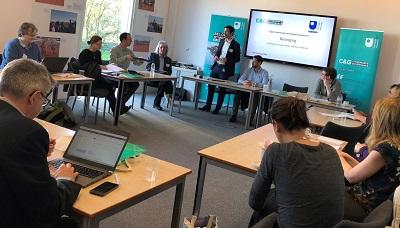You are here
- Home
- Year of Mygration
- Day 80, Year of #Mygration: Interdisciplinary Belonging Symposium
Day 80, Year of #Mygration: Interdisciplinary Belonging Symposium

Simon Lavis reflects on the Interdisciplinary Belonging Symposium which took place at The Open University on 18/19 April 2018.
"The sun appeared last week to brighten up the Open University’s Walton Hall campus and to welcome delegates to the OU Law School’s interdisciplinary Belonging Symposium, funded by its Citizenship and Governance Strategic Research Area. Academics from across the OU and other universities in the UK and Europe attended, representing social science disciplines ranging from law, business and political science to history, geography, sociology and communications, with their research all connected in some way to broad ideas around belonging. Altogether 21 papers were given by 22 delegates, including ten from the OU Law School, four from other OU departments and eight from other UK and European universities. The research presented was focused geographically on countries including Germany, Australia, Greece, Afghanistan, Sweden, Denmark, Russia and other post-Soviet states, and the nations of the UK.
"The range of methods, approaches and subjects meant for fascinating presentations, stimulating discussion and the discovery of some surprising and thought-provoking connections between them. They explored issues as diverse as citizenship and identity, colonialism and governmentality, austerity and community, cultural property and memory, nationalism and post-nationalism, migration, religion and tradition, gender and masculinity, rights, politics and ideology, agency and criminal responsibility, performance and shame, as well as, inevitably, Brexit, the rise of populism and nationalism, and the refugee crisis. Despite this, overlaps and connections between papers were often easy to find. The conference programme and book of abstracts are available to view.
Belonging and Mygration
"Migration as Mygration is closely connected to the question of belonging, and impinges on many of the issues highlighted above, and it was clearly in evidence as an important topic in the symposium.
"I was particularly struck by the attention drawn to citizenship and migration policy in Sweden and Denmark, with papers from Christian Fernandez, Clara Sandelind and Lisa Villadsen in this area. This was almost matched by the interrogation of UK immigration law, which played a role in papers by Neil Graffin and Sara De Jong. The similarity of themes in the nature and direction of policy in these different places was interesting and partly – but only partly – offset by Dimitris Christopoulos’ experience of nationality law reform in Greece between 2010 and 2015. The experience and impact of migration was also an important subtext in the research presented in many other papers, which only highlights again what a crucial question it represents in this moment. Blog post from some of these authors will be available on the Year of Mygration page in the coming days.
The Value of Interdisciplinarity
"It is difficult to predict what will happen when people from a wide range of disciplines are put together in the same room to share and discuss their research, not least because it is often difficult in academia to break out of the methodological and discursive constraints of a particular discipline. The research on offer in this symposium may all be related to similar broad themes to do with belonging, but it employs varying research methods, approaches and language to explore these themes. As it turned out (and as I had hoped), the symposium proved to be an advert for the benefits of interdisciplinarity, with all of the delegates engaging fully with the research on offer and holding some truly interesting discussions around the research.
"An indication of how an interdisciplinary event such as this benefits research can be illustrated by the impact it is likely to have on my own research as I let some of what I have learned percolate my thoughts over the coming days and weeks. My research into the theory and history of law in Nazi Germany overlaps with a small corner of the belonging umbrella, as I am interested in understanding how law was used to foster a sense of belonging among those Germans who were considered by the Nazis to be fit to continue to reside in the racial state they were trying to build, alongside how law was used to exclude, discriminate against and ultimately kill many of those who were not considered to belong.
"I was able to take approaches, ideas, methods and concrete conclusions from a number of papers that will help me to advance this research into the next stage. To give a few examples, Dimitris Christopoulos’ thoughts on the relationship between ideas, norms and administrative decisions in a legal system have helped to clarify what it is I am looking for. Christian Fernandez’ conceptualisation of the relationship between the surface and content of Sweden’s citizenship regime as being either ideologically thick or thin gives me one way of thinking about the question of how deep Nazi ideology actually went into the legal system. Marco Antonsich’s comments on how to adopt a more bottom-up approach to the next stage of my research were instructive, and his own provocative problematisation of the use of the concept of belonging has me thinking both about how personal feelings of belonging related to the political mobilisation of those feelings in Nazi Germany and how belonging should be treated as a process – how did people in the Third Reich transition gradually from feeling ‘at home’ in pre-Nazi Germany to coming to belong in a Nazified society? Lisa Pine’s examination of how the Nazis used policies to socialise some German citizens into acceptance of their ideological worldview while excluding those who did not belong to the Volksgemeinschaft (national community), beyond the law, were naturally very instructive for me. And Lisa Claydon continues to have me thinking about the uneasy question of the extent to which we can attribute agency and responsibility to those who might have been complicity in Nazi policies including the Holocaust at a comparatively low level, and especially as ‘ordinary’ Germans.
"Meanwhile, on a broader plane a number of presentations reminded me in different ways about how relevant aspects of the Third Reich and its legacy continue to be today, including those from Keren Lloyd Bright, Lisa Villadsen, Lisa Claydon, Neil Graffin and Clara Sandelind - there is still opportunity to learn from this terrible past. And beyond this, many papers either overlapped directly with my other research and teaching interests in areas such as public law and legal theory (Carol Howells and Edwin Parks, Sara De Jong, Hugh Mcfaul, Clara Sandelind, Neil Graffin, Matthew Howard) or resonated with me in other ways (Tim Butcher, Line Nyhagen, Leslie Budd, Harriet Bradley, Amanda Goodrich and Simon Lee).
"I only hope the other delegates enjoyed the symposium half as much as I did, and got even a fraction as much out of it!"
Simon Lavis is Lecturer in Law at The Open University.
Quarterly Review of Research
Read our Quarterly Review of Research to learn about our latest quality academic output.

Contact our news team
For all out of hours enquiries, please telephone +44 (0)7901 515891
